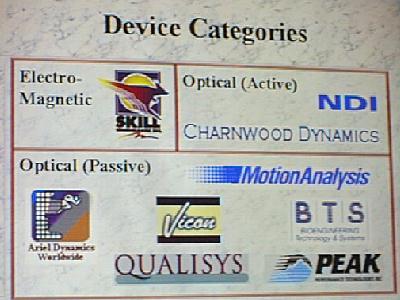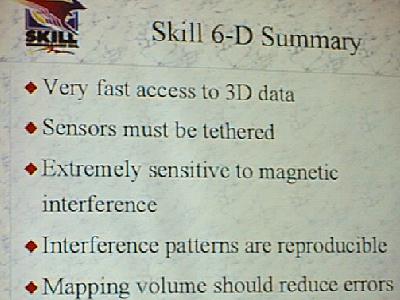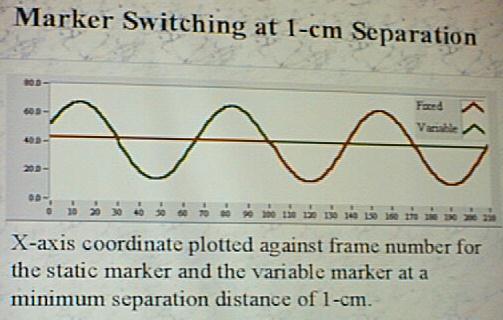The
purpose of the present article is to demonstrate the superiority of the APAS system over
all the other systems. Overall, the APAS system out performed the other
systems by a large margin.
In the present report, each
company was ranked according to the results. The company with the best results on a
particular parameter, received 5 points, the next position received 4 points, and so
on. The company with the worse result for this parameter received only 1 point.
(There were 7 different company products that were tested. Only five of the seven were
able to produce reliable results).
The companies included in
the comparison testing are pictorially illustrated in the slide below.:
Slide 8. Device Categories.

Ariel Dynamics, Inc. with
their APAS system
Motion Analysis Corporation with
their HiRes System
Peak Performance Inc. with
their Motus system
Qualisys with their ProReflex system
Vicon's with their 370 system
Elite (Could not calculate
adequate results and was not included in this article)
6D Technology (Produced too many
errors due to magnetic interference and was not included in this article. A summary was
presented at the conference and is shown in the slide below.)
Slide 9. Skill 6-D Summary.

Slide 9 illustrates the
Skill 6-D Summary as was presented at the conference. As one can see, this technology is
still new and did not meet the required standards. This technology depends on the subject
being hard wired to the sensors and is extremely sensitive to interference. This equipment
does not allow data collection on the field and movement is limited to an area of
approximately 3M only. Therefore, the present report did not include this technology in
the rating.
It
could be argued that this biased the experiment to some degree by making the Vicon and the
Peak companies score higher then they would otherwise if all the data point had been
considered as was the case with the Ariel and the Motion Analysis systems."The Peak Motus and the Vicon 370
systems were unable to correct switching paths at the 0-cm and 1-cm separation distances,
despite repeated attempts to adjust tracking parameters". Some companies such as
Elite and Codex produced so many errors that the researcher of this study choose not
to include them at all. In other cases, such as with the Peak and the Vicon
companies, errors were very large when detection points were switched around, so the
researcher of this experiment decided to choose only the good measurements.
Quoting the original report:
In the case of Peak and
Vicon, markers crossed paths. The data presented at the conference reported only a
subset of the data in which paths were correctly identified and this information was used
for the analysis. In this case, the Peak and Vicon received only 1 point each while all
the other companies that did not have this serious defect in their system received 3
points. The confusion of markers is considered as the most serious error in Movement
Analysis Systems.
Slide 10 illustrates the
serious problem that Peak and Vicon companies had with switching points. Once the points
were switched, it was impossible to correct them. In the case of the APAS system,
marker switching can never occur since the detection algorithm can maintain the marker
identification at all times.

Slide 10. Marker Switching occurred with the
Peak and Vicon Systems.
|